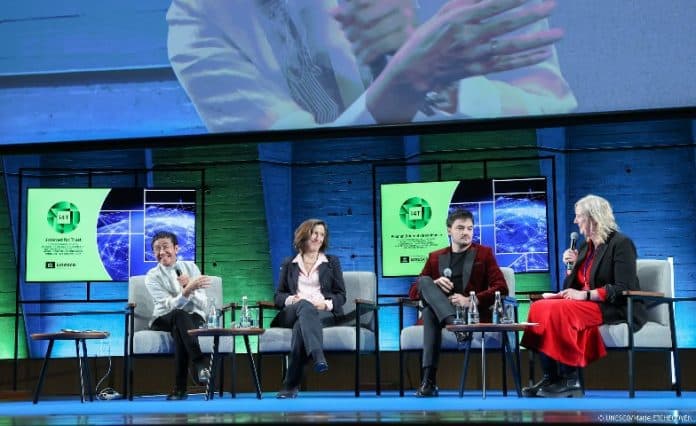From 21-23 February, UNESCO is hosting the “Internet for Trust” conference. The aim is to discuss a set of draft global guidelines for regulating digital platforms, to improve the reliability of information and protect freedom of expression and human rights.
Global solutions built around freedom of expression
Over 4,000 participants representing governments, regulatory bodies, digital companies, academia as well as journalists and civil society have been invited to attend the conference at the UNESCO Headquarters in Paris.
The conference responds to a global call for action from United Nations Secretary-General António Guterres to address the spread of disinformation and the denial of scientifically established facts.
The conference is a key opportunity for exchange between the different actors during the consultative process. UNESCO will finalise and publish the guidelines in mid-2023. The guidelines will then be used by governments, regulatory and judicial bodies, civil society, the media and the digital companies themselves to help improve the reliability of information online while promoting freedom of expression and human rights.
In her opening speech, UNESCO Director-General Audrey Azoulay pointed to the fact that the protection of free speech is essential: “We cannot allow the internet to fill with harmful content. We need an internet for trust”.
She also emphasised that regulatory initiatives must not be developed in isolation by single countries or in single regions. “Information disruption is a global problem. We must think of global solutions built around press freedom and the freedom of expression. Otherwise, we leave the field open to dangerous incursions of freedoms”.
Curbing mis- and disinformation
Among the participants in Paris are Nobel Peace Prize-winning journalist Maria Ressa; the Pulitzer prize-winning investigative journalist Julia Angwin; and Irene Khan, the UN Special Rapporteur for Freedom of Opinion and Expression.
In her keynote speech, Maria Ressa told conference participants that the business models of social media platforms incentivise lies, especially when laced with hate. She also offered solutions and hope: “Inspiration spreads as fast as anger”.
The investigative journalist and media executive underlined that content moderation shall only be at the end of curbing mis- and disinformation.
“When we focus only on content moderation, it’s like there’s a polluted river and we take a glass, we scoop out the water, we clean up the water, and then dump it back in the river. What we must do is go all the way to the factory polluting the river, shut it down, and then resuscitate the river. That’s the challenge in front of us,” Maria Ressa said.
Code of Conduct for information integrity
UN Under Secretary-General for Global Communications, Melissa Fleming, spoke at the opening panel, alongside Maria Ressa and Felipe Neto, a communicator and digital influencer from Brazil.
Melissa Fleming pointed out that “the UN has finally really woken up to the phenomenon of disinformation”.
The UN recently surveyed its own staff serving in UN peacekeeping missions around the world, and 44% responded that misinformation, disinformation and hate speech on social media is impacting their ability to carry out their job.
“The facts are being undermined and public trust is no longer really there. So, it’s much more difficult for the UN to make the world a better place,” the UN Under Secretary-General said.
Melissa Fleming is currently leading the process for developing a global ‘Code of Conduct for Information Integrity on Digital Platforms’, as called for by the Secretary-General in his report ‘Our Common Agenda’.
The report found that disinformation is damaging our information ecosystem in three main ways. First, it is undermining trust in scientific facts, which itself constitutes a massive security risk. Second, disinformation is warping public debate, often robbing it of arguments based on impartial evidence. Third, it has polluted the online sphere so badly that finding quality information has become very difficult.
The global Code of Conduct aims to address these problems. It will focus on the digital sphere, particularly on social media platforms and will also involve a global study on the extent to which content is causing real life harm, and how it is affecting the UN’s work around the world. The Code of Conduct seeks to put new guidelines in place and will provide a roadmap for the next steps.

